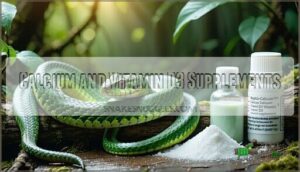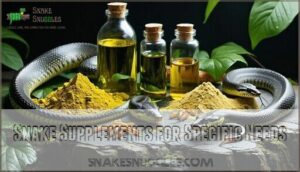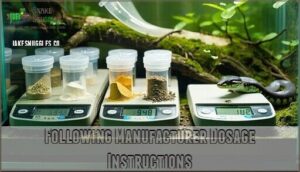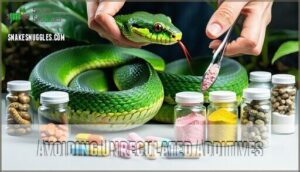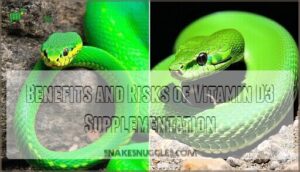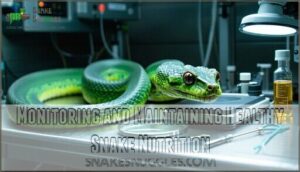This site is supported by our readers. We may earn a commission, at no cost to you, if you purchase through links.
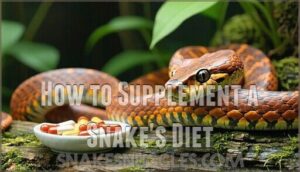
Focus on calcium-phosphorus balance and vitamin D3, which help prevent metabolic bone disease.
Dust feeder rodents lightly with supplements once or twice monthly – think of it as seasoning their meal.
Different species have varying needs, so ball pythons require different supplements than corn snakes.
Watch for signs like soft bones or poor appetite, which signal nutritional gaps.
Don’t overdo it though, as too much can be harmful, and understanding your snake’s specific requirements is key.
The key lies in understanding your snake’s specific requirements and choosing quality products designed for reptiles, to prevent issues like metabolic bone disease.
Table Of Contents
- Key Takeaways
- Essential Nutrients for Snakes
- How to Supplement a Snake’s Diet
- Types of Supplements for Snakes
- Snake Supplements for Specific Needs
- Safe Supplement Administration and Overdose Prevention
- Benefits and Risks of Vitamin D3 Supplementation
- Boosting a Snake’s Appetite With Supplements
- Snake Feeding Techniques and Schedules
- Common Snake Nutritional Deficiencies and Solutions
- Monitoring and Maintaining Healthy Snake Nutrition
- Frequently Asked Questions (FAQs)
- Do snakes need supplements?
- How do you feed a snake a healthy diet?
- How do you keep a snake healthy?
- What nutrients do snakes eat?
- Do snakes need a varied diet?
- Do frozen snakes need vitamin D?
- What supplements do snakes need?
- What is the most nutritious food for snakes?
- What is alternative food for snakes?
- How do you feed a snake that won’t eat?
- Conclusion
Key Takeaways
- You’ll need to dust your snake’s prey with calcium and vitamin D3 supplements once or twice monthly to prevent metabolic bone disease and support healthy shedding – think of it as seasoning their meal rather than overdoing it.
- You can’t use a one-size-fits-all approach since different snake species have varying nutritional requirements – ball pythons need different supplements than corn snakes, so research your specific species’ needs.
- You’ll want to watch for deficiency warning signs like soft bones, poor appetite, incomplete shedding, or lethargy, which signal nutritional gaps that supplements can address before they become serious health problems.
- You should choose reptile-specific supplements from quality brands like Rep-Cal or Zoo Med rather than generic products, and always follow dosage instructions precisely since over-supplementation can be more harmful than helpful.
Essential Nutrients for Snakes
Your snake’s health depends on getting the right balance of calcium, phosphorus, vitamin D3, protein, and trace minerals that whole prey alone can’t always provide.
Think of supplements as your snake’s insurance policy—they fill nutritional gaps and prevent serious health problems like metabolic bone disease, which can turn your slithery friend into a weak, unhappy reptile.
Calcium and Phosphorus Balance
Your snake’s calcium-to-phosphorus ratio works like a nutritional seesaw that needs perfect balance.
Think of your snake’s minerals as a perfectly balanced recipe—too much of one ingredient ruins the whole dish.
The ideal ratio of 2:1 or 3:1 calcium-to-phosphorus prevents metabolic bone disease and supports healthy shedding.
Without proper calcium absorption, your snake faces serious health impacts including muscle weakness and skeletal deformities.
- Supplement types include calcium powder dusted on prey items
- Dietary sources from gut-loaded feeder insects boost natural intake
- Deficiency signs appear as tremors, lethargy, and shedding problems
Vitamin D3 Importance
Your snake’s UVB lighting isn’t just for show—it triggers D3 synthesis that’s essential for calcium absorption and bone development.
Without proper vitamin D3, you’ll notice deficiency symptoms like poor shedding and weakness.
Snake supplements can help when natural UVB isn’t available, but balance is key.
| UVB Source | D3 Production | Benefits |
|---|---|---|
| Natural sunlight | High | Ideal calcium absorption |
| UVB bulbs | Moderate | Controlled indoor environment |
| Vitamin supplements | Variable | Backup when lighting fails |
| No UVB | None | Deficiency risk increases |
Protein Requirements
While vitamin D3 handles calcium absorption, protein requirements form the backbone of your snake’s diet.
Whole prey like appropriately-sized mice and rats deliver complete amino acids your snake can’t produce alone.
These support muscle development and digestion efficiency throughout different growth stages.
Prey variety matters too – rotating between mice, rats, and other appropriate feeders prevents nutritional gaps.
Gut loading prey animals 24-48 hours before feeding boosts protein quality substantially.
Remember, snake nutritional supplements can’t replace quality whole prey for meeting core protein requirements.
Trace Minerals
Like tiny keys that activate essential body functions, trace minerals keep your snake’s immune system and metabolism running smoothly.
Zinc, copper, and selenium work behind the scenes, supporting healthy shedding and appetite.
While whole prey provides most mineral absorption needs, watch for deficiency symptoms like poor skin condition.
Quality reptile supplements offer precise dosage when natural sources fall short.
How to Supplement a Snake’s Diet
You’ve learned about the nutrients your snake needs, but knowing how to actually provide them makes all the difference between a healthy pet and potential health problems.
The key lies in selecting quality supplements, understanding proper dosages, and using safe administration techniques that won’t stress your snake or create nutritional imbalances.
Choosing The Right Calcium Supplement
Getting calcium right feels like picking the perfect recipe ingredient. Your snake calcium supplement needs specific calcium ratios – aim for that golden 2:1 or 3:1 calcium-to-phosphorus ratio that prevents reptile calcium deficiency.
Getting your snake’s calcium balance right is like finding the perfect recipe – precision matters more than guesswork.
Consider these supplement brands and options:
- Powdered options like Rep-Cal offer easy dusting
- Liquid forms work for picky eaters
- Vet recommendations guarantee calcium supplements meet your snake’s needs
To further explore, research reptile health concerns is essential for snake owners.
Selecting Reptile-Specific Vitamins
Once you’ve sorted your calcium needs, reptile-specific vitamins become your next priority.
Look for reputable brands like Rep-Cal or Zoo Med that offer balanced supplement formulations with proper Vitamin A sources – beta carotene works best for snake vision health.
These snake vitamin supplements provide dosage precision you can’t get from generic products.
Always choose formulas designed specifically for serpents rather than general reptile vitamin supplements to guarantee the best health outcomes.
Administering Supplements Safely
Once you’ve selected the right vitamins, safe supplement administration becomes your next priority. Think of it like following a recipe – precision matters more than enthusiasm.
Here’s your step-by-step approach to supplement administration:
- Follow dosage accuracy guidelines religiously – measure with precision tools, never eyeball amounts
- Maintain proper storage practices by keeping supplements cool, dry, and away from sunlight
- Watch for over-supplementation signs like lethargy, unusual behavior, or digestive issues
- Schedule regular veterinary consultation to adjust dosing based on your snake’s health
- Keep detailed supplement tracking records to monitor patterns and prevent overdoses
Whether you’re dusting prey or using liquid supplements, remember that supplement overdose poses serious risks. Document every session – your snake’s health depends on it.
Types of Supplements for Snakes
You’ll find three main categories of supplements that can transform your snake’s health: calcium and vitamin D3 combinations for strong bones and proper shedding, protein and amino acid boosters for growth and muscle development, and trace mineral blends that support immune function and metabolism.
Think of these supplements as your snake’s nutritional insurance policy, filling gaps that even the best whole-prey diet might miss, which is crucial for strong bones.
Calcium and Vitamin D3 Supplements
Your snake’s calcium supplements and vitamin D3 work like a dynamic duo for bone health.
Maintain a proper calcium-to-phosphorus ratio of 2:1 or 3:1 to prevent MBD and support healthy shedding. While UVB lighting provides natural D3 sources, supplement alternatives include liquid drops or powder dusting.
Consider reptile calcium options to guarantee proper nutrition. Monitor calcium absorption carefully—supplement toxicity from overdosing causes serious health issues.
Boost calcium intake through quality brands like Rep-Cal, but balance is key for ideal nutrition.
Calcium Powder
Liquid D3
UVB Bulbs
Combined Supplements
Protein and Amino Acid Supplements
Beyond calcium and D3, protein sources matter for your snake’s amino balance. Whole prey typically covers all essential amino acids, but recovering snakes might need nutritional support.
Commercial supplement forms boost digestion efficiency and growth support when natural feeding fails.
Consider these reptile nutritional support options for snake diet improvement:
- NEKTON-REP – Complete amino acid formula
- Rep Cal Herptivite – Multi-vitamin with protein building blocks
- Exo Terra Multi Vitamin – Energy production support
- Bee pollen powder – Natural amino acid source
- Liquid protein injections – For prey enhancement
Trace Mineral Supplements
Your snake’s body depends on trace minerals like a car needs oil – without them, everything breaks down.
These micronutrients power immune function, metabolism, and cellular repair through proper mineral absorption.
Quality mineral supplements prevent deficiency symptoms while maintaining ideal mineral ratios:
- Zinc supports immune strength and smooth shedding cycles
- Copper enables red blood cell formation and energy metabolism
- Selenium provides antioxidant protection and thyroid regulation
Choose reputable supplement sources to avoid dangerous supplement interactions.
Some owners also purchase zinc supplements for snakes.
Snake Supplements for Specific Needs
Different snake species have unique nutritional requirements, and what works for your ball python won’t necessarily suit your friend’s corn snake.
You’ll need to tailor your supplement approach based on your snake’s species, age, health status, and specific dietary challenges to guarantee proper nutrition and prevent deficiencies.
Supplements for Ball Pythons
When caring for your ball python, you’ll want to establish a proper supplement schedule that works with their unique needs.
Dust prey with calcium powder every other feeding for adults, while juveniles need it more frequently to support growth.
Ball python nutrition improves substantially with UVB lighting, which helps them produce vitamin D3 naturally and supports healthy shedding cycles.
Consider reptile supplements that include trace minerals, especially if you’re feeding commercially-bred rodents that often lack essential nutrients.
Watch for obesity risks by monitoring feeding frequency and portion sizes.
Vitamin supplements snakes receive should complement, not replace, a balanced whole-prey diet for peak health.
Supplements for Insectivorous Snakes
When feeding your insectivorous snake, you’re basically playing nutritionist since insects lack essential nutrients.
Here’s your supplement game plan:
- Dust insects with calcium powder before every feeding to prevent bone disease
- Gut-load crickets and mealworms 24 hours prior using commercial diets like Repashy Superload
- Rotate supplement schedules – calcium without D3 weekly, with D3 monthly
- Add vitamin A sources through reptile-specific multivitamins to support eyesight and immunity
Supplements for Snakes With Health Issues
When illness strikes, targeted supplementation becomes your snake’s lifeline to recovery.
Working with your vet, you’ll develop a supplement plan addressing specific health challenges.
- Immune boosters containing beta-glucans for fighting infections
- Probiotics benefits include restoring gut health after antibiotic treatments
- Anti-parasitic formulas with natural herbs like black walnut
- Anorexia solutions and electrolyte supplements for shedding problems
Remember, vitamin supplementation supports—never replaces—proper veterinary care for snake health issues.
Safe Supplement Administration and Overdose Prevention
You wouldn’t give your snake a double dose of medicine just like you wouldn’t take extra vitamins without checking the label first.
Proper supplement administration requires following exact dosage instructions and watching for signs that your snake’s getting too much of a good thing, because overdosing can turn helpful nutrients into harmful toxins.
Following Manufacturer Dosage Instructions
Dosage precision separates healthy snakes from sick ones.
Read every manufacturer label like your snake’s life depends on it—because it does.
Use measuring tools like digital scales or precise spoons instead of guessing.
That "pinch of this, dash of that" approach works for cooking, not snake supplements.
Over-supplementation risks include organ damage and metabolic issues.
Store supplements in cool, dry places to maintain potency.
Create a tracking supplementation log noting dates, amounts, and your snake’s response.
This prevents accidental double-dosing and helps identify patterns.
Remember: supplement administration requires patience and accuracy.
Vitamin dosage and mineral dosage guidelines exist for good reason—stick to them religiously.
Avoiding Unregulated Additives
Proper supplement dosage protects your snake, but additive risks from unregulated products can undermine everything.
Veterinary oversight matters when selecting safe supplement administration options.
Commercial supplements from reputable brands offer tested formulations, unlike questionable alternatives:
- Bee pollen – zero reptile-specific research backing claims
- Plant extracts – carnivorous snakes can’t process vegetation properly
- Homemade vitamin cocktails – dangerous ingredient sourcing and ratios
- Untested "miracle" formulas – lack quality control standards
Choose high-quality supplements designed specifically for reptiles.
Monitoring Snake Health
Since your snake can’t tell you how they’re feeling, behavior changes become your best clue.
Track weight management weekly and watch for shedding patterns that seem off.
Physical examination should include checking hydration levels and appetite shifts.
| Health Indicator | What to Monitor |
|---|---|
| Weight Management | Weekly measurements, sudden gains/losses |
| Shedding Patterns | Complete vs. incomplete sheds |
| Behavior Changes | Lethargy, aggression, hiding |
| Hydration Levels | Skin elasticity, eye clarity |
| Physical Examination | Overall body condition, alertness |
Snake health monitoring prevents vitamin deficiencies before they become serious.
When snake wellbeing seems questionable, veterinarian consultation beats guesswork every time.
Benefits and Risks of Vitamin D3 Supplementation
Vitamin D3 supplementation can be your snake’s best friend or worst enemy, depending on how you handle it.
You’ll need to balance the benefits of stronger bones and better calcium absorption against the serious risks of overdosing, which can damage your pet’s kidneys and other essential organs, posing a significant threat to their health due to overdosing.
Importance of Vitamin D3 for Snakes
Your snake’s body works like a solar panel, converting UVB exposure into vitamin D3 for calcium absorption.
Without proper D3 synthesis, your pet can’t build strong bones or shed properly. Deficiency symptoms include soft shells, poor appetite, and lethargy.
- Stronger bones that won’t bend or break
- Smooth shedding without stuck pieces
- Better appetite and active behavior
Risks of Over-Supplementation
While vitamin D3 supports your snake’s health, excess vitamins create serious problems.
Vitamin toxicity causes organ damage, particularly affecting the liver and kidneys.
Calcium buildup from over-supplementation leads to snake bone buildup and dangerous supplement interactions.
Dosage precision matters—too much can be deadlier than too little.
Always practice careful monitoring behavior to prevent supplement overdose complications.
Signs of Vitamin D3 Deficiency
Recognizing vitamin D3 deficiency early can save your snake from serious health problems.
When your reptile lacks this essential nutrient, you’ll notice troubling changes that shouldn’t be ignored.
Watch for these key vitamin deficiencies warning signs:
- Bone Weakness and metabolic bone disease symptoms like soft jaw or spine deformities
- Poor Shedding with stuck skin pieces that won’t come off naturally
- Muscle Spasms combined with lethargy and appetite loss
These snake vitamin deficiencies often develop gradually, making them easy to miss initially.
If you spot any reptile vitamin deficiency symptoms, contact your veterinarian immediately for proper diagnosis and treatment.
Boosting a Snake’s Appetite With Supplements
When your snake turns its nose up at mealtime, targeted supplements can help restore its natural appetite and get feeding back on track.
You’ll find that vitamin D3, calcium boosters, and hydration enhancers work together to stimulate hunger while addressing underlying nutritional gaps that might be causing the feeding strike.
Stimulating Appetite With Vitamin D3
Appetite troubles can make feeding time stressful for any snake owner.
Vitamin D3 works like a metabolic key, activating your snake’s natural hunger drive.
UVB lighting provides the gold standard for natural D3 production, but supplements offer reliable alternatives when lighting isn’t feasible.
Watch for appetite deficiency signs like food refusal or lethargy—proper supplement timing can restore their eating enthusiasm quickly.
Increasing Calcium Intake
Building on vitamin D3’s appetite-boosting effects, calcium intake becomes your next priority.
Your snake’s bones depend on adequate calcium sources, and boosting this mineral can actually stimulate feeding behavior too.
- Dust prey items with calcium powder before each feeding session
- Maintain 2:1 calcium to phosphorus ratio through quality snake supplements
- Schedule supplement timing around regular feeding days for consistency
- Provide UVB exposure to enhance natural calcium absorption
- Monitor for MBD prevention signs like muscle twitching or weak grip
Smart dietary adjustments make all the difference in your snake’s health.
Encouraging Hydration
Beyond calcium, proper hydration keeps your snake’s appetite strong.
Place your snake water dish in a quiet corner—privacy matters! Maintain humidity levels around 50-60% using misting techniques or humid hides.
Soaking options work great for stubborn feeders; try brief 10-minute sessions.
Quality water sources prevent illness. Fresh, clean water supports reptile dietary needs and overall health better than any hydration supplements.
Snake Feeding Techniques and Schedules
You’ll need to master the timing and technique of feeding your snake to guarantee proper nutrition and supplement absorption.
Getting the prey size right and establishing a consistent schedule helps your snake maintain healthy weight while maximizing the benefits of any dietary supplements you provide, which is crucial for supplement absorption.
Determining Appropriate Prey Size
Getting the right prey size prevents regurgitation causes and obesity risks that plague many pet snakes.
You’ll want to measure your snake’s thickest section, then select prey that’s slightly wider than this measurement. Think of it like buying shoes—too small won’t work, too big creates problems.
Follow this snake feeding guide for ideal results:
- Match prey width to your snake’s girth at the widest point
- Consider snake age when selecting appropriate prey animals
- Monitor feeding frequency to prevent overfeeding and health issues.
Perfect sizing keeps your reptile thriving.
Feeding Frequency Based on Age and Species
Timing matters in regard to feeding frequency. Juvenile feeding requires more meals since young snakes grow rapidly, while adult intervals can be spaced further apart. Each snake species has unique needs that affect how often they eat.
- Age-specific needs: Hatchlings eat every 5-7 days, adults every 10-14 days
- Species variations: Ball pythons differ from corn snakes in feeding schedules
- Obesity prevention: Monitor weight to avoid overfeeding your snake
- Shedding frequency: Snakes may refuse food before shedding cycles
- Species-specific diets: Research your snake’s natural feeding patterns for ideal health
Handling and Presentation of Food
Once you’ve nailed down feeding frequency, proper handling makes all the difference.
Always use food tongs to present meals—your snake won’t appreciate surprise visits from your hand.
Whether you’re offering live vs. frozen prey, make certain it reaches room temperature first.
Thawing methods matter: refrigerator overnight or warm water work best.
Consider scenting techniques if your snake’s picky, and supplement injection into prey boosts nutrition.
Remember, force-feeding risks outweigh benefits—patience wins every time.
Food Tongs
Gut Loading
Proper Frequency
Common Snake Nutritional Deficiencies and Solutions
Your snake’s sluggish behavior and poor shedding might signal nutritional gaps that even a perfect feeding schedule can’t fix.
Your snake’s health issues can be addressed by learning to spot the warning signs of calcium, vitamin D3, and trace mineral deficiencies.
You’ll discover practical solutions that restore your pet’s health and wellness, which is crucial for their overall wellbeing, including practical approaches to handling deficiencies.
Signs of Malnutrition in Snakes
Recognizing malnutrition in your snake isn’t rocket science, but it requires keen observation.
When nutritional deficiencies strike, your serpent’s body sends clear distress signals that shouldn’t be ignored.
Watch for these telltale signs of trouble:
- Lethargy and weakness – Your normally active snake becomes sluggish and unresponsive
- Weight loss and muscle wasting – Visible thinning along the spine and reduced body mass
- Shedding issues and skin abnormalities – Incomplete sheds, dull coloration, or poor appetite during feeding time
Common Vitamin and Mineral Deficiencies
Spotting malnutrition symptoms leads us to the specific vitamin deficiencies and mineral deficiencies plaguing your snake. Calcium Deficiency tops the list, causing weak bones and Shedding Problems. Vitamin D3 shortages prevent calcium absorption, creating a double whammy. Mineral Imbalance affects everything from appetite to Immune Suppression.
Watch for these red flags in your snake diet:
- Soft, bendable jaw bones that feel rubbery
- Incomplete sheds with stuck skin patches
- Lethargy combined with poor feeding responses
These vitamin deficiencies don’t happen overnight, but calcium and reptile supplements can turn things around.
Corrective Dietary Measures
Addressing deficiencies requires targeted dietary adjustments.
You’ll need supplement timing that matches your snake’s feeding schedule for maximum absorption.
Reversing overfeeding and appetite stimulation work hand-in-hand to address appetite issues.
Monitoring and Maintaining Healthy Snake Nutrition
You can’t just feed your snake and hope for the best—regular monitoring keeps your scaly friend healthy and helps you catch problems before they become serious.
Think of it like being a detective, using weight checks, fecal exams, and blood work to solve the mystery of whether your snake’s getting the right nutrition.
Regular Weight Checks and Body Condition Scoring
Regularly weighing your snake isn’t just good practice—it’s your health detective work in action! Weekly weight trend analysis reveals patterns that casual observation might miss.
A digital scale provides precise measurements for tracking your snake’s progress over time.
Body condition scoring goes beyond numbers on a scale. Check for visible spine definition, rib prominence, and overall muscle tone. Healthy snakes display firm muscle mass evaluation without excess fat deposits around their neck or body.
Hydration level assessment affects weight readings, so weigh consistently. Monitor how shedding cycle impact and activity level correlation influence these measurements for thorough snake health monitoring.
Fecal Examination for Nutritional Assessment
Your snake’s droppings reveal nutritional secrets that regular observation can’t. A fecal examination by your reptile vet uncovers hidden issues affecting your pet’s wellbeing.
Here’s what vets discover through parasite detection and analysis:
- Nutrient absorption efficiency from dietary supplements
- Gut microbiome balance indicating digestive health
- Digestion efficiency showing food processing success
- Dietary impact on overall intestinal function
- Nutritional deficiencies requiring supplement adjustments
Blood Work for Nutritional Imbalances
While fecal exams reveal digestive health, blood work offers deeper insights into your snake’s nutritional status.
Interpreting results helps identify deficiency biomarkers like low calcium or vitamin levels.
Your reptile vet will establish frequency guidelines and handle sample collection properly.
Veterinary consultation guarantees accurate analysis of nutritional deficiencies, giving you actionable steps to optimize your snake nutrition before problems escalate.
Frequently Asked Questions (FAQs)
Do snakes need supplements?
Your slithery friend’s prey alone won’t cut it for complete nutrition.
You’ll need calcium, vitamin D3, and trace minerals to prevent metabolic bone disease and boost immunity.
Think of supplements as your snake’s nutritional insurance policy.
How do you feed a snake a healthy diet?
Feed your snake appropriately-sized whole prey like mice or rats based on species needs.
Maintain proper feeding schedules, verify prey quality, and dust with calcium supplements when necessary to support healthy health.
How do you keep a snake healthy?
Like tending a delicate garden, you’ll maintain your snake’s health through proper temperatures, humidity levels, clean water, appropriate prey sizing, regular vet checkups, and monitoring for shedding issues or behavioral changes.
What nutrients do snakes eat?
Snakes need calcium, phosphorus, vitamin D3, and essential amino acids from whole prey like mice or rats.
They also require trace minerals including zinc, copper, and selenium for proper immune function and metabolism.
Do snakes need a varied diet?
While snakes aren’t picky eaters like your cousin at Thanksgiving, you don’t need to worry about dietary variety.
Most species thrive perfectly on their primary prey—mice or rats—which provides complete nutrition.
Do frozen snakes need vitamin D?
Nearly 80% of captive snakes develop metabolic bone disease from vitamin D deficiency.
Yes, your frozen snake absolutely needs vitamin D3 supplements since they can’t produce it naturally without UVB lighting or proper supplementation.
What supplements do snakes need?
Your snake needs calcium and vitamin D3 supplements for bone health, plus trace minerals like zinc and copper.
You’ll also want reptile-specific multivitamins to prevent deficiencies and support immune function effectively.
What is the most nutritious food for snakes?
Here’s the secret to peak reptile nutrition: whole prey like mice and rats delivers everything your serpent craves.
These protein powerhouses contain perfect amino acid profiles, essential fats, and natural vitamins that supplements simply can’t replicate completely, which makes them a crucial part of whole prey nutrition.
What is alternative food for snakes?
Alternative foods include quail, chicks, rabbits, fish, and commercially prepared diets for variety.
You’ll want to research your species’ natural prey preferences.
Always make certain of proper sizing and nutritional balance when introducing new food options.
How do you feed a snake that won’t eat?
Coaxing a stubborn eater requires patience and strategy.
Try warming frozen prey, offering different prey sizes, reducing handling stress, checking temperatures, or scenting prey with preferred food odors to encourage feeding response.
Conclusion
Successfully learning how to supplement a snake’s diet isn’t rocket science, despite what some overzealous reptile forums might suggest.
You’ve got the essential knowledge: dust prey with calcium and vitamin D3 supplements once or twice monthly, monitor for deficiency signs, and avoid overdoing it.
Different species have unique needs, so tailor your approach accordingly.
Regular health monitoring confirms you’re on track, and with quality supplements and proper technique, you’ll keep your serpentine friend thriving for years ahead.

